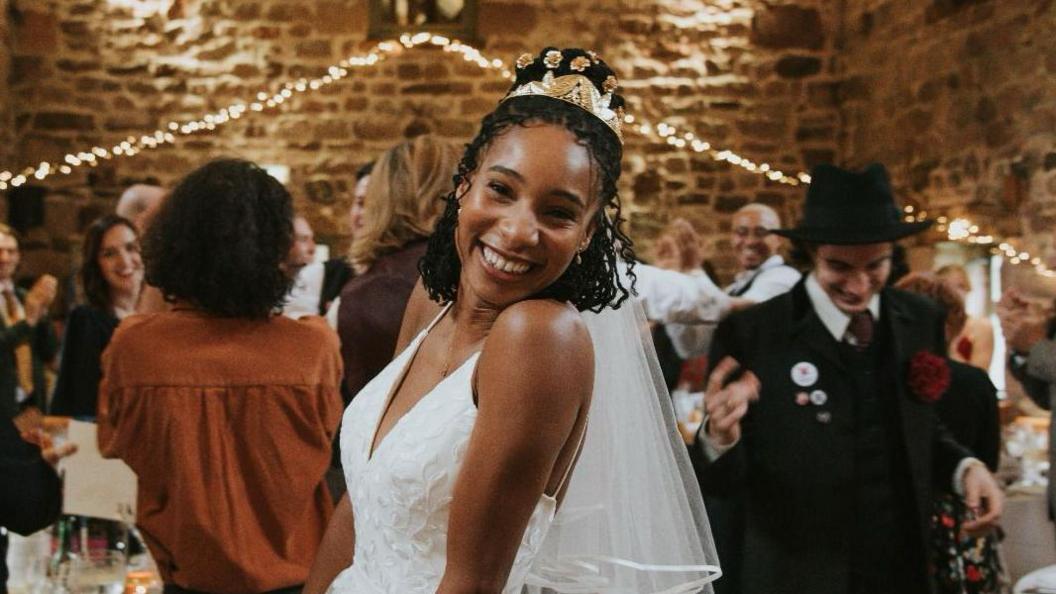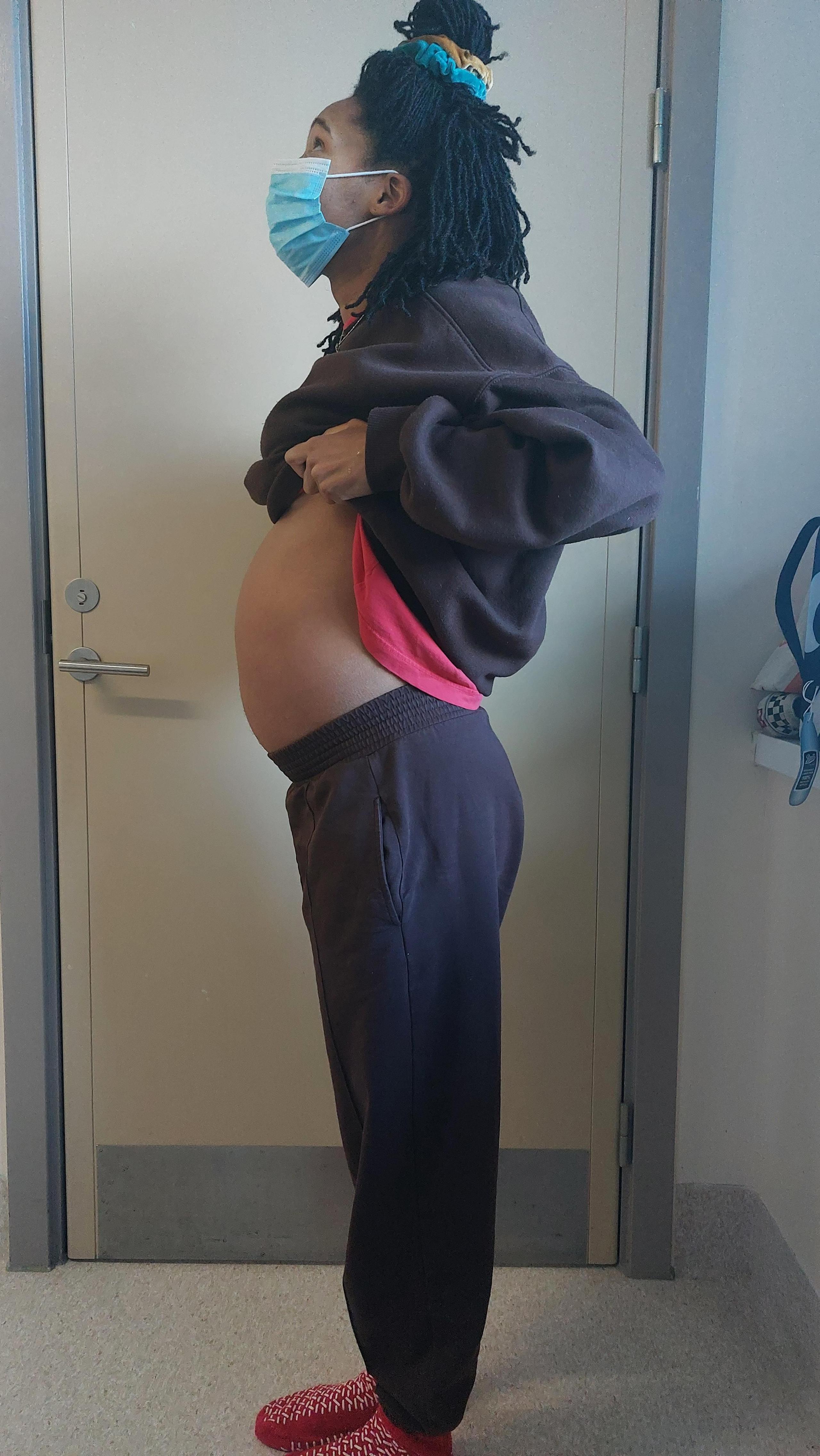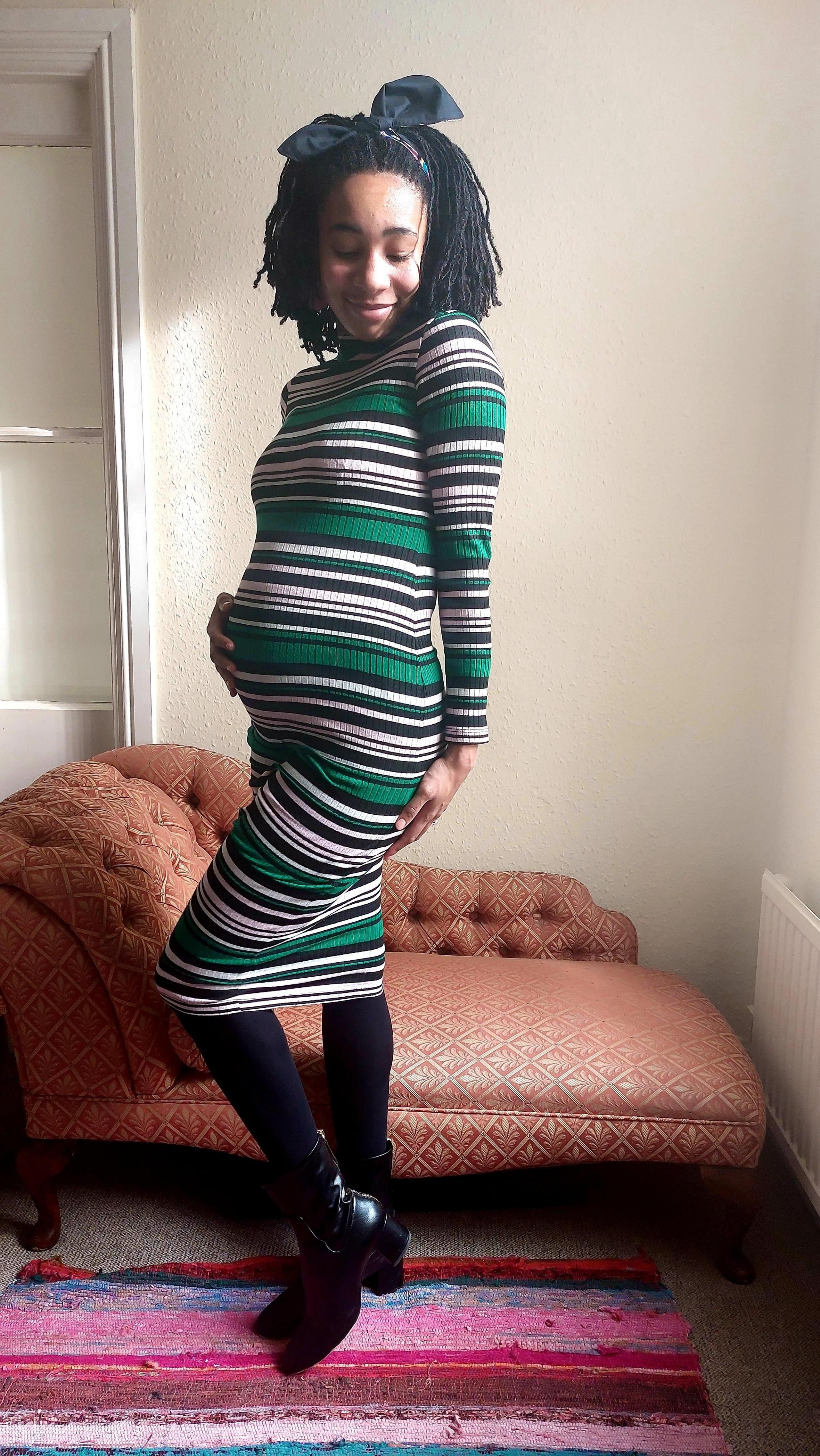Cancer taught Casualty actor to say yes to life

Shalisha says her cancer diagnosis and surgery has changed all aspects of her life
- Published
Two months after being told she was too young to have cancer, Shalisha James-Davis was rushed to hospital in debilitating pain.
The actor, 30, who has appeared in Casualty and Mary Queen of Scots, woke from surgery to be told the football-sized tumour was indeed ovarian cancer after all.
It was mucinous ovarian cancer, a type that is rare, with its complexities making it "challenging to diagnose", a spokeswoman for the health trust involved said.
A nurse with the Ask Eve cancer charity, external said she had seen many cases of women being told they were too young to be investigated properly, and had struggled to get a diagnosis for one of the five gynaecological cancers, external.
Amy Dowden reflects on life after cancer treatment
- Published13 April
Boy, three, gets 'magic eye' after cancer surgery
- Published10 April
Three years on, the harrowing experience has left Shalisha determined to make the most of every facet of life.
The irony of playing a doctor in a fake hospital was not lost on her when she was wheeled into the real theatre space for emergency surgery in 2022.
"I didn't know what I was meant to feel," she said.
"Grateful? Relieved? There was no toolbox, I had no-one to talk to about how I was meant to feel – so I just felt angry.
"Angry with myself for maybe not pushing more – angry with the NHS for taking one look at me and dismissing me because of my age, my demographic."
Saying 'Yes' to Life
Shalisha James-Davis has new perspective on life after cancer ordeal
Watch now on iPlayer
The actor's symptoms had developed over a number of months in 2021, and when she returned from three months filming in Spain she spoke to her GP about back pain and bloating.
She was referred for a scan, which revealed a four inch (10cm) tumour on her right ovary.
After further investigations, she said a multi-disciplinary team at the hospital in Nottingham talked her through the results.
"They said because of my age, and the sort of cells that were inside my tumour, times that by X, multiply this by Y and Z - you don't have cancer," she said.

Shalisha asked the costume department on the set of Casualty to alter her scrubs to disguise the bloating.
Shalisha was told there was a six-month wait for surgery to remove the tumour.
She returned to the set of Casualty, relieved not to have cancer, but still with a distended stomach and "excruciating pain".
"Bless the costume department - I couldn't really tell anyone, so I asked if they could just make my scrubs a bit bigger, because I couldn't have people thinking I was pregnant," she said.
Not even Shalisha's family knew cancer was a possibility, as she did not want to scare them without knowing the full facts.
"It was a very lonely experience because it was just me and my husband going through this," she said.

Shalisha and her husband, Samuel Herons, on their wedding day, not long before her symptoms started
Things came to a head in the spring of 2022.
"One morning in early March I woke the whole house up screaming - my tumour was twisting inside my abdomen," Shalisha said.
"I couldn't keep painkillers down so we had to call an ambulance."
Following surgery, doctors discovered the 12 inch by 12 inch (30cm x 30cm) tumour was mucinous ovarian cancer.
"I didn't let anyone apart from my husband and my best friend come and visit me in hospital, because I didn't want to see in my mum's eyes how sick I looked," Shalisha said.
She said processing her diagnosis also came with challenges, adding: "The pamphlets and websites never showed anyone younger than 40, let alone a black woman."
She credits the nurses volunteering with charity Black Women Rising, external with saving her life.
"There were times where I was at a point that if I didn't speak to someone right then, I was going to lose my mind and spiral – and I didn't know how to climb out of that," Shalisha said.
"But even within that community, I still haven't met a young woman with mucinous ovarian cancer who is of my Caribbean heritage.
"There's a lot of culture there – a rich history that is instilled into me – of having my own back and being strong, and I needed another woman to be like 'girl, I get it, I understand'."

Shalisha played Paige Allcott in the BBC One medical drama Casualty
Shalisha also praised the after-care she received from the oncology team in Cardiff, but said her cancer had changed "every single facet of life" including her attitude to her own body.
When she awoke from surgery she had around 29 staples down her stomach.
"It took me a long time to look in the mirror, and a while before I started to see how incredible it is and what it represents," she said.
"Every time I get changed I'm reminded of what my body went through – but three years on I'm so proud of this tiny body that has got me to where I am now."
Since leaving Casualty in 2024 Shalisha has taken on a number of theatre roles, presented Saying Yes to Life for BBC Radio Wales, and also worked with charities to raise awareness of ovarian cancer, even though talking about it can still be difficult.
"People assume because I'm an actor I'm good at talking - but in work people write lines for me," she added.
"Speaking about my experience is completely new to me."
"Mucinous ovarian cancer is a rare form of cancer and the complexities of a case can make it challenging to diagnose," said Nottingham University Hospitals NHS Trust's director of nursing and professions Rachel Boardman.
"However, where there are concerns, various tests and scans are used to identify the cancer, which would be assessed at a multidisciplinary level, in order to maintain an accurate diagnosis and a treatment plan to be delivered as quickly as possible."
Ask Eve nurse Helen Hyndman said: "I speak to many young women who get in touch with Ask Eve for advice who struggled to get their diagnosis of one of the five gynaecological cancers.
"Women tell me that they felt that because of their age, they were seen as 'too young' for cancer to be investigated."

Shalisha James-Davis said the bloating from the tumour made her look heavily pregnant.
What are the symptoms of gynae cancers?
There are five gynaecological cancers - womb, ovarian, cervical, vulval and vaginal.
Ms Hyndman said: "The symptoms of the five cancers include abnormal vaginal bleeding, unexplained pelvic pain, changes to bladder or bowel habits or vulva itching, all of which can be caused by other much more common and less serious conditions.
"This means it's usually appropriate to test for other conditions before checking for cancer in younger women and people with gynae organs.
"But if you can't find a cause, or your symptoms persist or worsen, don't be afraid to mention the word cancer to your doctor and ask for tests."